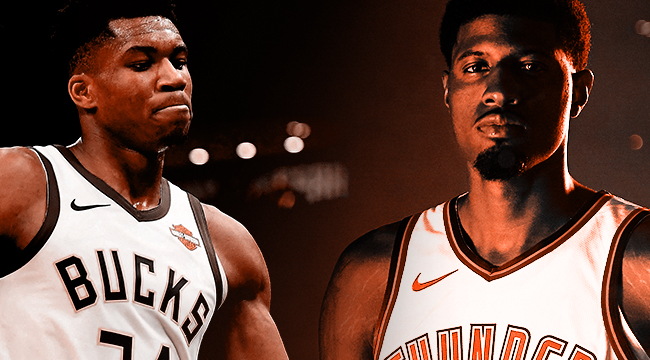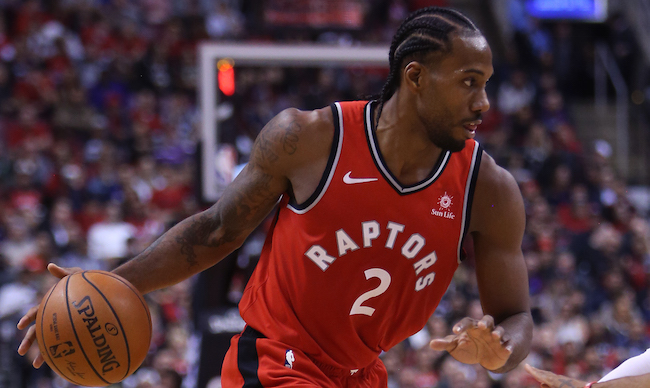
NBA players are evaluated with more specificity than ever before. The basketball media, on the whole, has a firmer grasp on the overall impact of players, stemming from things like statistical analysis and more advanced video scouting. Front offices are more sophisticated than ever, with off-the-charts research teams digging into the sport in ways that were virtually inconceivable even a decade ago. Even fans are smarter than ever before and, while there are still maddening debates that take on an “old-school against new-school” feel, the availability of information has been fantastic in growing the sport from coast to coast.
With that as the backdrop, it is time to kill, or at least severely adjust, the use of one specific term used to analyze and discuss players. That term is “two-way,” which is used as a descriptor of a player’s ability to make an impact on both offense and defense.
Of course, the use of the word “two-way” to describe players isn’t new and, when used in a reasonable context, it can be (and often is) accurate. For example, Kawhi Leonard is perhaps the poster child for the adjective, as the two-time Defensive Player of the Year also happens to be a wonderfully gifted and efficient offensive player. Elsewhere, players like Jimmy Butler, Paul George and Klay Thompson are deservedly given the distinction.
However, there is a theme, at least in some circles, when using “two-way” as something of a catch-all term, which is to give credit on players who don’t take anything off the table defensively. It is, quite obviously, better for a player to excel on both ends of the floor and no one would dispute that. As you can see above, though, the term is disproportionately used on wing players that aren’t seen as uber-elite on the offensive end, while, say, big men are largely ignored in these discussions.

For instance, Anthony Davis and Giannis Antetokounmpo are, quite easily, two of the top-10 players in the NBA. Both are tremendous offensive forces but, in the same breath, the defensive impact made by Davis and Antetokounmpo is incredibly significant, to the point where each could garner legitimate Defensive Player of the Year buzz and earn votes for NBA All-Defense honors. Given that baseline, it seems odd that Davis and Antetokounmpo aren’t mentioned in “best two-way player” conversations, and they aren’t alone.
What about Kevin Durant? Yes, Durant is inconsistent defensively but, as a general rule, he is an average defender or better while being a top-2 scorer in the league for a decade. How about Joel Embiid? The big man is a relative newcomer to the uber-elite tier of NBA players but, defensively, there are few in the game that make a greater impact and, at the moment, Embiid is on the short list of best offensive centers in the NBA, which should prove his “two-way” bonafides.
There are many rabbit holes available when discussing the term and its impact on the overall basketball discussion but, simply put, it isn’t necessary, at least as a catch-all. Part of the reason for utilizing “two-way” is the difficult way in which defense can be discussed in general terms, as many more casual fans have little interest and/or discernment when deciding which players make a positive impact on that end of the floor. If we simply slap a distinction like “two-way” on the proceedings, it is a way to tip a cap to defense as something of relative importance. Plus, if a player isn’t considered a “two-way” force, it is more, more often than not, the defensive end that is seen as inferior.
It is possible in 2018 to discuss NBA players with more nuance and, perhaps more importantly, basketball discussion can be elevated without the widespread use of “two-way” to nod toward any high-end offensive player that is defensively capable. Make no mistake, “two-way” will be used as a descriptor moving forward, with lists of the “best two-way players” popping up each and every year. If compilations such as that exist, though, it is probably a wise idea to remember big men, point guards (hello, Chris Paul and Ben Simmons), and players that might even be better on the defensive end (Draymond Green) than the offensive end.
In some circles, more advanced NBA discussions are already happening but, as we move forward into what many would consider to be an elite era for the league, it’s time to be a little more diligent with one particular turn of phrase.






